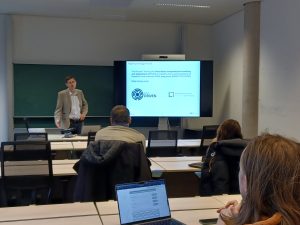The Computational and Data-Driven Science Doctoral Training Unit (DTU DRIVEN), funded under the FNR PRIDE programme, has successfully concluded its six-year research and training activities at the University of Luxembourg. This ambitious initiative, launched in 2018, aimed to cultivate a new generation of doctoral researchers skilled in developing data-driven modelling approaches applicable to diverse fields of strategic importance to Luxembourg’s research and innovation landscape.
Through a meticulously structured interdisciplinary training framework, DTU DRIVEN provided its doctoral candidates (DCs) with expertise in advanced statistical analysis, machine learning, and data-driven modelling. The research agenda spanned three key application domains: Computational Physics and Engineering Sciences, Computational Biology and Life Sciences, and Computational Behavioural and Social Sciences. The DTU’s overarching goal was to establish a bridge between cutting-edge data-driven methodologies and domain-specific applications, fostering innovative discoveries and new methodological insights.
Key accomplishments
One of the key accomplishments of DTU DRIVEN has been the significant reinforcement of Luxembourg’s expertise in data-driven discovery and artificial intelligence. The doctoral training unit enhanced competencies in applied mathematics, statistics, and computer science, strengthening the foundation for interdisciplinary collaboration in computational research. Additionally, the project contributed to methodological advancements in machine learning and data analysis, reinforcing the University of Luxembourg’s position as a hub for computational sciences.
A defining characteristic of DTU DRIVEN was its focus on equipping PhD candidates with the ability to integrate thematic domain knowledge into the development and deployment of computational models. This cross-disciplinary capability ensures that graduates are not only proficient in technical methodologies but also adept at addressing domain-specific challenges in their respective research fields. The programme instilled in its researchers a critical awareness of the limitations and challenges associated with data-driven techniques, fostering a comprehensive perspective on computational research.
‟ This approach enabled our Doctoral candidates to tackle problems from multiple angles, resulting in innovative, scientifically robust, and practically applicable solutions.”

Full professor in Mechanics and Structural Analysis
One of the programme’s lasting contributions to doctoral education is the Machine Learning Seminar series, which was initiated during the COVID-19 pandemic. This seminar has since become a sustained forum for academic exchange, featuring contributions from national and international experts. With over 100 sessions to date, it continues to serve as a platform for knowledge dissemination and scientific dialogue, reflecting the enduring impact of DTU DRIVEN beyond its official project duration.
Collaborative approach
DTU DRIVEN’s collaborative approach extended across all three Faculties of the University of Luxembourg and involved key national research institutions such as the Luxembourg Institute of Science and Technology (LIST) and the Luxembourg Institute of Socio-Economic Research (LISER). By embedding the doctoral training unit within the university’s existing Doctoral School structure, the project established the institution’s first transversal doctoral programme, integrating interdisciplinary education with established best practices in doctoral training.
Alignment with national and European strategies
The outcomes of DTU DRIVEN align closely with Luxembourg’s Smart Specialisation Strategies and broader European initiatives, such as Digital Lëtzebuerg and the Important Project of Common European Interest on High-Performance Computing (HPC) and Big Data Enabled Applications. The competencies developed within the DTU significantly enhance Luxembourg’s ability to harness the vast quantities of data generated globally, contributing to the country’s digital transformation and competitiveness in data-driven research and innovation.
For further details on the project, including research outcomes, team members, and the doctoral training approach, please visit the DTU DRIVEN website at https://driven.uni.lu.
